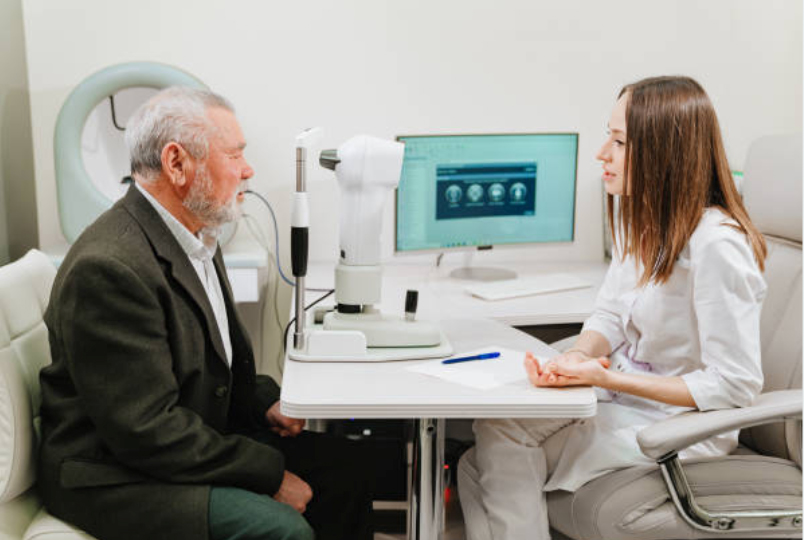Nanoscope Therapeutics’ clinical stage gene therapy, MCO-010, focuses on restoring vision for people suffering from retinal degenerative diseases.
MCO-010 is currently under development and is not yet approved for patient use outside of clinical trials. We are currently engaging with the US Food & Drug Administration and the European Medicines Agency on a path to approval.
If you would like to receive future updates about the progress of MCO-010, we invite you to join our mailing list.

The Unmet Need Addressed by MCO-010
Retinal degenerative diseases are devastating conditions, where outer retinal neurons (photoreceptors), the light-sensitive cells in the eye, progressively dysfunction or die off, leading to severe vision loss in patients. Since photoreceptors do not regenerate, vision loss from these conditions is permanent. To date, no treatment has been approved that restores vision in these patients.
Inherited retinal dystrophies (IRDs) are hereditary retinal degenerative conditions that are passed down through families (parents to children). IRDs are presently the leading cause of blindness in the working-age population. There are hundreds of genetic mutations that are known to cause IRDs.
Retinitis pigmentosa (RP) is a group of inherited eye disorders that affect the retina. RP is caused by mutations that have been found in over 100 different genes, each contributing to the development and functioning of the retina. RP is characterized by the progressive degeneration and dysfunction of the retina’s rod and cone photoreceptor cells, which are responsible for converting light into electrical signals that the brain interprets as vision. Initially, it affects peripheral vision leading to tunnel vision and in later progression impacts central vision. RP typically manifests during childhood or adolescence, but it can also present in adulthood. RP results in permanent and progressive vision loss to the point of profound blindness.
Stargardt disease, also known as Stargardt macular dystrophy or juvenile macular degeneration, is an inherited eye disorder that affects the macula in the center of the retina. The macula is responsible for sharp central vision. Stargardt disease is typically diagnosed during childhood or adolescence, although it may be identified in adulthood.
The symptoms of Stargardt disease include central vision loss, blurry or distorted vision, difficulty recognizing faces, impaired color vision, and a blind spot in the central field of vision. The peripheral vision, however, usually remains intact. Patients with advanced Stargardt disease unfortunately arrive at the same state of profound vision loss due to photoreceptor degradation as patients with RP.
Age-related Macular Degeneration (AMD) is a retinal degenerative condition that affects the aging population and is the overall leading cause of retinal blindness. Irrespective of form (wet or dry AMD), in the end stage, geographic atrophy (GA) occurs wherein the outer retina is degenerated.

Nanoscope Technology and Differentiation
Optogenetics is a gene therapy approach whereby an exogenous gene encoding light-sensitive proteins (opsins) are utilized to functionalize cells to become sensitive to light.
When photoreceptors degenerate, most of the other neurons of the retina survive in the patients. By making the surviving retinal cells sensitive to light, optogenetics aims to enable the generation of visual signals in the opsin-sensitized retinal neurons that are transmitted through the optic nerve to the brain. Optogenetic therapies are designed to work independently of the underlying genetic mutation(s)/cause(s) of retinal degeneration, and do not require retinal pigment epithelium/photoreceptor viability, thus offering the potential for vision restoration even in the later stages of retinal degenerative diseases.
Since the mechanism of action of optogenetic therapy is different from classical gene therapy, the therapeutic efficacy is expected to be independent of the underlying mutation(s). A limitation of traditional gene therapy approaches is that they are only able to target individual mutation(s) and consequently, one small subset of IRD patients are eligible for treatment. Further, as compared to classical gene therapy, optogenetic therapy does not require the presence of photoreceptors, therefore, it can also be applied to severe vision loss patients lacking photoreceptors.
Multi-Characteristic Opsin (MCO), is Nanoscope’s proprietary, patent protected opsin. MCO is comprised of 3 functional components fused into a single transgene. These components exhibit properties that are necessary for high quality optogenetic vision (high light sensitivity, responsiveness across visible spectrum, and fast light response kinetics) when expressed in the target cells. MCO is highly light sensitive across the entire color bandwidth of visual light with fast kinetics to minimize blur, thus maximizing light to potentially enable detailed and high-quality vision without the need for high intensity amplification of ambient light signals to restore a patient’s vision.
MCO-010 (sonpiretigene isteparvovec) is a proprietary, patent protected, adeno-associated virus type 2 (AAV2) based gene therapy expressing MCO. MCO-010 is designed to efficiently transduce and impart functional light sensitivity to bipolar cells in patients with significant vision loss due to photoreceptor degradation. MCO-010 is being evaluated for the treatment of severe vision loss in patients with retinitis pigmentosa and in patients with Stargardt Disease.
MCO-010 is delivered via a one-time, in-office, intravitreal injection after which, bipolar cells in the retina express the MCO protein, making them light sensitive.
Bipolar cells exist in closer proximity to photoreceptors vs retinal ganglion cells (RGC). As such, targeting these cells has the potential to preserve greater visual processing circuitry. Additionally, unlike RGCs, bipolar cells do not have lateral extending processes, allowing for more accurate activation. Further, there are approximately ten times as many bipolar cells as RGCs, providing the potential for greater spatial resolution.
MCO has been designed such that each of the three light-sensitive components is sensitive to a different portion of the visible spectrum of light. Thus, when expressed as one fusion protein, light sensitivity is conferred across the different colors of visible light.
There are a number of other optogenetic approaches currently in varying stages of preclinical and clinical development. MCO is the only optogenetic opsin that is broadband (i.e., responsive to the whole visual light spectrum/colors). MCO-010 is delivered to retinal cells via a one-time, intravitreal injection. Post-injection, the expressed MCO has a high light sensitivity, fast response speed and is sensitive across the entire spectrum of visible light, and therefore does not require an external intense light stimulation/amplification device.
MCO-010 is the only optogenetic platform that has is fast, sensitive and sensitive across the visible spectrum, in a mutation and disease agnostic manner to treat retinal degenerative diseases (RP and Stargardt).
No. While many other developmental optogenetic approaches require high intensity amplification or external stimulation devices, MCO is light sensitive across the entire spectrum of visible light due to its multiple light sensing components and does not require high intensity light stimulation. High dynamic range is achieved by the unique characteristics of the multi-component system behind MCO.
MCO-020 contains a next generation MCO opsin that is administered intravitreally as a naked DNA (no viral packaging) that is delivered to specific target cells via an Optical Coherence Tomography-guided laser platform. MCO-020 is being developed for treating patients with severe vision loss from end-stage AMD.

Target Patient Profile
MCO-010 is designed for patients with severe IRD-related vision loss regardless of mutation. MCO-010 is currently being studied in patients with a clinical diagnosis of advanced retinitis pigmentosa or Stargardt disease, regardless of their underlying genetic mutation.
Although MCO-010 is designed for patients with late-stage disease, exhibiting severe IRD-related vision loss, it is possible that patients with moderate loss of vision may also benefit. We are presently evaluating the path to more fully answer this question.
No. The MCO-010 mechanism of action is mutation agnostic, as the introduced light sensitivity is being imparted to bipolar cells instead of trying to repair/regrow the photoreceptors that IRDs impact. MCO-010 has the potential to represent one treatment for all late-stage inherited retinal diseases.

Clinical Trials and Access to Patients
Interventional trials for MCO-010 and MCO-020 in 2024 are in the planning phase and we will update here next year.
There are a number of other trials in which patients are participating in ongoing long-term follow-up (LTFU) from the original studies. They are not accepting new patients for treatment in these studies. Details for these studies can be found by following the hyperlinks:
- Original Phase 1/2a trial of RP patients in India NCT04919473 and the associated LTFU study NCT05921162.
- The RESTORE Phase 2b multi-center, randomized, double-masked, sham-controlled clinical trial (NCT04945772) LTFU will be initiated shortly.
- The company will also initiate a LTFU for the Phase 2 STARLIGHT trial of MCO-010 therapy in Stargardt patients (NCT05417126).
Further information will be available here, https://nanostherapeutics.com/pipeline/clinical-trials/
MCO-010 is currently under development and is not yet approved for patient use outside of clinical trials. We are currently engaging with the US Food & Drug Administration and the European regulators on a path to approval.
The cost of MCO-010 is not decided at this stage and cost effectiveness will be determined in future via Health Economics and Outcome Research.


